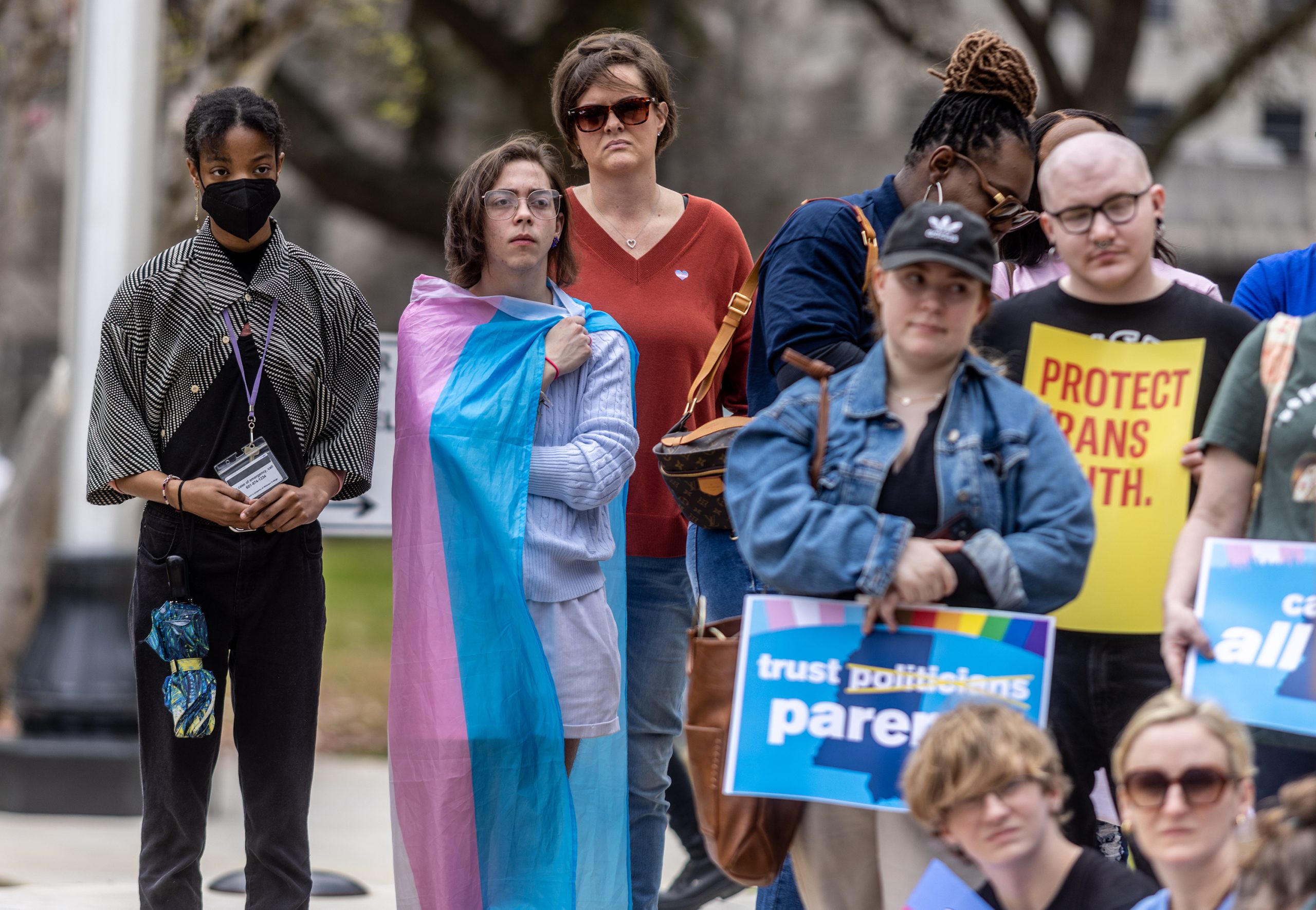Mississippi Today
Mississippi Medicaid spent a tiny fraction of its budget on gender-affirming care before lawmakers banned it

Mississippi Medicaid spent a tiny fraction of its budget on gender-affirming care before lawmakers banned it
The Mississippi Division of Medicaid spent months working to determine how much it paid in claims associated with gender identity disorder or gender dysphoria following an anonymous legislative request, according to emails obtained through a public records request.
The answer: A maximum of $58,900.82 in taxpayer money over the last five years from the agency's annual budget of $6 billion – nearly half of which paid for a mastectomy to treat a “life-threatening disease” that was not gender dysphoria. No money was paid to providers for intersex surgery for trans men or trans women.
Attorneys for Medicaid initially miscalculated the answer, but after many back and forths over email with a representative from a legislative committee, landed on this imperfect estimate.
It is unclear from the documents how much Medicaid paid in reimbursements specifically for gender-affirming care for trans youth. It is also unclear which procedures are directly related to gender-affirming care. Some include descriptions of routine medical claims such as emergency room visits and lipid panels. Only one reimbursement could be more easily connected to gender-affirming care for trans children: $94.20 for “bone age studies.”
In a letter to Mississippi Today, Medicaid noted that some claims “may not be directed related to” services for a patient's primary diagnosis of gender dysphoria.
The Division of Medicaid did not answer questions from Mississippi Today for this story.
Earlier this year, Medicaid became the first state agency to take a public position on gender-affirming care for trans children as lawmakers sought to ban it. In mid-February, Executive Director Drew Snyder sent a letter stating that there is not enough medical literature to support that it is a “safe and effective treatment for gender dysphoria” for trans youth.
Snyder's letter did not mention Medicaid reimbursements for gender-affirming care.
Rob Hill, the state director of Human Rights Campaign of Mississippi, said that Snyder's letter contradicts Medicaid's past actions of paying for gender-affirming care. Despite Medicaid's letter, major medical associations support gender-affirming care for trans youth.
“I've always known Drew Snyder to be a fair-minded person, so I would say I was really disappointed to see this letter released that was not based on fact,” Hill said. “There is plenty of research that he or his folks in the department could've done. It's easily found on the internet. I could have sent him a fact sheet.”
For trans people, it can be challenging to get gender-affirming care covered by private health insurance. Trans people report being uninsured at a rate seven times higher than cis people, due in significant part to job discrimination and the employment-based health insurance model in the U.S., according to a report from the Center for American Progress. That same report found that 46% of trans respondents – and 56% of trans respondents of color – said their health insurance denied coverage for gender-affirming care.
“Honestly, I'm glad to know that people have received (gender-affirming) care in Mississippi through Medicaid, through taxpayer dollars,” Hill said. “But I would like to see it be a lot more because this care is well-researched for decades and supported by all the major medical associations.”
One of the first signs that gender-affirming care would become a flashpoint during the legislative session came last fall when the Mississippi Freedom Caucus, a far-right wing of the Legislature, published a blog post by Rep. Dana Criswell of Olive Branch that claimed public dollars were funding the “mutilation of children” at the University of Mississippi Medical Center.
“You read that correctly, you, the taxpayers of Mississippi, are paying for children to receive hormone therapy and for mutilation of children,” the post read.
But during the legislative session, lawmakers spent little time on the issue of state funds supporting gender-affirming care despite efforts to determine the amount.
Lawmakers' first inquiry to Medicaid came in mid-December from Lonnie Edgar, the deputy director of the Joint Legislative Performance Evaluation and Expenditure Review Committee. The PEER Committee is tasked with assisting legislators with requests for information and the results of its research are confidential.
On Dec. 13, 2022, Edgar sent an email to Cody Smith, an attorney for Mississippi Medicaid, asking if the agency had reimbursed claims for gender-affirming care “anywhere else in the state besides UMMC.” Edgar noted that “this is similar to the request you all provided information on about Planned Parenthood facilities on September 13, 2022.”
Edgar told Mississippi Today he is not allowed to disclose who made the request or whether any similar requests have been made in the past. He also did not have an answer as to why the request excluded UMMC.
It could be that PEER already had information about the medical center. In August 2022, the PEER committee also sent an inquiry to UMMC asking if it had billed gender-affirming services to Medicaid.
Smith responded to Edgar about two weeks later, writing that Medicaid had determined a total of $131,865.03 was paid for 47 visits. He noted that no payments were made to the Spectrum Clinic in Hattiesburg, the only clinic in the state that exclusively serves transgender patients. Medicaid's research found that the agency has reimbursed providers across the state, including Singing River and UMMC, for care given to people with gender dysphoria.
After House lawmakers passed HB 1125 early in the session, the inquiries from Edgar continued.
“This request seems to change every iteration,” Edgar wrote on Jan. 26. “Based on the information you provided on Medicaid claims broken out by provider … can you also determine the amounts spent on puberty blocking hormones or cross sex hormone treatment?”
It doesn't appear that Medicaid was able to determine that amount since Medicaid-enrolled prescribers are not required to give a diagnosis code to pharmacists.
Soon after, Smith and Brett Brown, a technology specialist at Medicaid, discovered an error in the initial accounting.
Brown realized that the previous number Medicaid had provided lawmakers – $131,865.03 – was more than double the actual amount the agency had paid out because it included Medicaid “crossover claims.” Crossover claims occur for people who are eligible for both Medicare and Medicaid. Medicare, federal health insurance for people 65 or older, pays a portion of the claim, and Medicaid is billed for any remaining deductible or coinsurance.
Hill said there's “no number” that can be put on the positive impact gender-affirming care has on trans people and especially trans youth.
“Anybody who suggests that it's wasted money – one, I would think that they don't have a heart,” he said, “and two, they're just absolutely wrong.”
This article first appeared on Mississippi Today and is republished here under a Creative Commons license.
Did you miss our previous article…
https://www.biloxinewsevents.com/photo-essay-the-lodge-at-sweetwater-studios/
Mississippi Today
PSC axes solar programs in light of EPA funds, advocates file lawsuit
Advocates from some of the state's conservation groups — such as Audubon Delta, Mississippi Sierra Club and Steps Coalition — spoke out Wednesday against a recent decision by the Mississippi Public Service Commission to suspend several solar programs, including “Solar for Schools,” less than two years after the previous commission put them in place.
“This is particularly disappointing because the need for these incentives in the state of Mississippi is significant,” said Jonathan Green, executive director of Steps Coalition. “Energy costs in the South, and in particular the region known as the Black Belt, are higher than those in other parts of the country for a number of reasons. These regions tend to have older energy generation infrastructure, and housing that has not been weatherproofed to modern standards. For many low- to moderate-income residents in the state of Mississippi, energy burden and energy insecurity represent real daily economic challenges.”
The PSC voted 2-1 at its April docket meeting to do away with the programs, reasoning in part that new funds through the Inflation Reduction Act would be available to the state. About 10 days later, the Environmental Protection Agency awarded $62 million to the state, through the Hope Enterprise Corporation, to help low-income Mississippians afford adding solar power to their homes. The funds are part of the Biden Administration's Solar for All program, one of the several recent federal initiatives aimed at reducing greenhouse gas emissions.
The PSC decision ended three programs the previous commission put in place to encourage wider adoption of solar power through the two power companies it regulates, Entergy Mississippi and Mississippi Power: “Solar for Schools,” which allowed school districts to essentially build solar panels for free in exchange for tax credits, as well as incentives for low-income customers and battery storage.
Last Friday, the Sierra Club filed lawsuits in chancery courts in Hinds and Harrison counties against the commission, arguing the PSC broke state law by not providing sufficient reasoning or public notice before making the changes. Advocates also argued that new funding going to Hope Enterprise won't go as far without the PSC's low-income incentives.
The programs were part of a 2022 addition to the state's net metering rule, a system that allows homeowners to generate their own solar power and earn credits for excess energy on their electric bills. Mississippi's version is less beneficial to participants than net metering in most states, though, because it doesn't reimburse users at the full retail cost. Mississippi's net metering program itself is still in tact.
Northern District Commissioner Chris Brown said that, while he supported efforts to expand solar power, he didn't think programs that offer incentives from energy companies were fair to other ratepayers.

“It's the subsidy that we take issue with,” Brown said at the meeting. “It's not the solar, it's not the helping the schools. We just don't think it's good policy to spread that to the rest of the ratepayers.”
Brown and Southern District Commissioner Wayne Carr voted to end the programs, while Central District Commissioner De'Keither Stamps voted against the motion. All three are in their first terms on the PSC. Brown's position is in line with what the power companies as well as Gov. Tate Reeves have argued, which is that programs like net metering forces non-participants to subsidize those who participate.
Robert Wiygul, an attorney for the Mississippi Sierra Club, countered that argument during Wednesday's press conference, saying that net metering actually helps non-participants by adding more power to the grid and reducing the strain on the power companies' other infrastructure. Moreover, he said, the PSC hasn't offered actual numbers showing that non-participants are subsidizing the program.
“Look, if the commission wants to talk about that, we are ready to talk about it,” Wiygul said. “But what we got here is a situation where these two commissioners just decided they were going to do this. We don't even know what that claim is really based on because it hasn't been through the public notice and hasn't been through the public comment process.”
While no schools had officially enrolled in “Solar for Schools,” which went into effect in January of last year, Stamps told Mississippi Today that there were places in his district getting ready to participate in the very programs the PSC voted to suspend.

“My issue was we should have talked to the entities that were going through the process to (understand what they were doing) to participate in the programs before you eliminate the programs,” he said.
Several school districts in the state are already using solar panels thanks to funding from a past settlement with Mississippi Power. Officials there told Mississippi Today that the extra power generated from the panels has freed up spending for other educational needs. During the public comment period for the 2022 net metering update, about a dozen school district superintendents from around the state wrote in to support the initiative. Ninety-five school districts in the state would have been eligible for the program because they receive power from Entergy Mississippi or Mississippi Power.
Former commissioner Brent Bailey, who lost a close reelection bid in November to Stamps, was an advocate for the schools program that the PSC created while he was there. At the April docket meeting, he pleaded with the new commission to reconsider, arguing that the new federal funding won't have the same impact without those programs.
“My ask is to at least give this program a chance, see where it goes, and hear from stakeholders that have participated,” Bailey said. The solar programs, he added, weren't just about expanding renewable energy, but taking advantage of a growing economy around solar power as well: “We can just stand by and watch it go by, or we can participate in this and bring economic development to the state.”
This article first appeared on Mississippi Today and is republished here under a Creative Commons license.
Crooked Letter Sports Podcast
Podcast: In or out (of the NCAA Tournament)?

College baseball's regular season is in its last week, which means baseball bracketology is a popular activity. State needs to finish strong to become a Regional host. Southern Miss probably has already punched its ticket as a 2- or 3-seed. Ole Miss, playing its best baseball presently, needs victories, period. Meanwhile, the State High School softball tournament is this week in Hattiesburg, and the state baseball tournament comes to Trustmark Park in Pearl next week.
Stream all episodes here.
This article first appeared on Mississippi Today and is republished here under a Creative Commons license.
Did you miss our previous article…
https://www.biloxinewsevents.com/?p=358148
Mississippi Today
Reeves again blocks funds for LeFleur’s Bluff project in Jackson
For the third consecutive year legislative efforts to direct state money to renovate LeFleur's Bluff in Jackson have been stymied, thanks in large part to Gov. Tate Reeves.
Earlier this week, the Republican governor vetoed a portion of a bill that directed $14 million to the office of Secretary of State Michael Watson for work on developing and improving a nature trail connecting parks and museums and making other tourism-related improvements in the LeFleur's Bluff area.
It is not clear whether the Legislature could take up the veto during the 2025 session, which begins in January, though, that's not likely. The Legislature had the option to return to Jackson Tuesday to take up any veto, but chose not to do so.
Of the project, Watson said, “Our office was approached late in the session about helping with a project to revitalize LeFleur's Bluff. As Mississippi's state land commissioner, I was more than happy to help lead this effort not just because it's a natural fit for our office, but also because I believe Mississippi needs a thriving capital city to retain our best and brightest. Investing state funds in state property on a project to enhance the quality of life in Jackson makes good sense.
“Unfortunately, some only support it when it equates to campaign contributions. Sadly, through the line-item veto of the appropriation, Mississippians will once again wait another year for the opportunity to benefit from state investments for the greater public good.”
Various groups, such as representatives of the Mississippi Children's Museum and many other community leaders have been working on the project for years. The area already is the home of the Children's Museum, Museum of Natural History, Mississippi Sports Hall of Fame and Museum and a state park.
The issues with LeFleur's Bluff first arose in 2022 when Reeves vetoed a $14 million appropriation that in part was designed to redesign and create a new golf course in the area. Previously, there had been a nine-hole, state-owned golf course operated by the Department of Wildlife, Fisheries and Parks at LeFleur's Bluff State Park.
In 2022, the LeFleur's Bluff project was one of literally hundreds of projects funded by the Legislature – many of which was tourism projects like LeFleur's Bluff. The governor only vetoed a handful of those projects.
When issuing the LeFleur's Bluff veto, Reeves said the state should not be involved in funding golf courses.
Then last year $13 million was directed to the Department of Wildlife, Fisheries and Parks to spend on the LeFleur's Bluff project. But legislative leaders said state money would not go toward a golf course.
Lawmakers opted to transfer the project to the Secretary of State's office late in the 2024 session, apparently in part because they felt the Department of Wildlife, Fisheries and Parks had not made enough of an effort to begin the project.
Lynn Posey, executive director of Wildlife, Fisheries and Parks, said that before moving forward with the project, “We felt like we needed to do engineering work and see what the situation was. We never got a chance to move forward” because the Legislature redirected the money.
Posey said an engineer's report was needed because “it is a unique piece of land.” He said much of the land is prone to flooding.
He said before that work could begin the Legislature switched the authority to the Secretary of State's office. Posey was appointed to his current position by Reeves, whose office had no comment on the veto.
Lt. Gov. Delbert Hosemann said after the governor's veto, “Projects like the LeFleur's Bluff development are critical to the Capital City, the wider metropolitan area, and our state. Public parks add to the quality of life for our citizens. I am hopeful the individuals involved in this project, including those at the Mississippi Children's Museum, will continue their work to improve this state asset.”
While the Constitution instructs the governor to provide to the Legislature a reason for any veto, Reeves did not do so this year when vetoing the money going to the Secretary of State's office.
On Monday, the governor also vetoed a portion of another bill dealing with appropriations for specific projects. But in this case, the veto was more of a technicality. The bill was making corrections to language passed in previous sessions. In that language were five projects the governor vetoed in 2022.
The language, as it was written, would not have revived those previously vetoed projects, the governor said. But Reeves said he vetoed the five projects out of caution. He did the same in 2023 when those five projects, which included money appropriated in 2022 for the Russell C. Davis Planetarium in Jackson, were carried forward in a bill also making corrections to previously passed legislation.
This article first appeared on Mississippi Today and is republished here under a Creative Commons license.
-
SuperTalk FM3 days ago
Martin Lawrence making 3 stops in Mississippi on comedy tour
-
Our Mississippi Home2 days ago
Beat the Heat with Mississippi’s Best Waterparks
-
Mississippi News6 days ago
Man arrested for allegedly breaking into home, robbing owner
-
Mississippi Today6 days ago
Lawmakers may have to return to Capitol May 14 to override Gov. Tate Reeves’ potential vetoes
-
SuperTalk FM7 days ago
Couple arrested after husband received unemployment benefits while in prison
-
Mississippi News Video5 days ago
Local dentists offer free dental care in Amory
-
Our Mississippi Home3 days ago
Charlie’s U-Pik: Opening Soon for the Summer Season
-
Mississippi News6 days ago
Bond set for West Point couple accused of killing their child




























![HIGH SCHOOL SOFTBALL: Vancleave @ East Central (5/9/2024) [5A Playoffs, South State]](https://www.biloxinewsevents.com/wp-content/uploads/2024/05/1715460379_maxresdefault-80x80.jpg)





